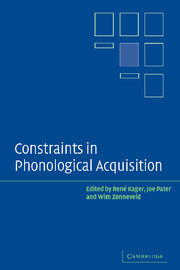Book contents
- Frontmatter
- Contents
- List of contributors
- Abbreviations
- Preface
- 1 Introduction: constraints in phonological acquisition
- 2 Saving the baby: making sure that old data survive new theories
- 3 Markedness and faithfulness constraints in child phonology
- 4 Input elaboration, head faithfulness, and evidence for representation in the acquisition of left-edge clusters in West Germanic
- 5 Phonological acquisition in Optimality Theory: the early stages
- 6 Syllable types in cross-linguistic and developmental grammars
- 7 Bridging the gap between receptive and productive development with minimally violable constraints
- 8 Learning phonotactic distributions
- 9 Emergence of Universal Grammar in foreign word adaptations
- 10 The initial and final states: theoretical implications and experimental explorations of Richness of the Base
- 11 Child word stress competence: an experimental approach
- Index of subjects
- Index of names
11 - Child word stress competence: an experimental approach
Published online by Cambridge University Press: 22 September 2009
- Frontmatter
- Contents
- List of contributors
- Abbreviations
- Preface
- 1 Introduction: constraints in phonological acquisition
- 2 Saving the baby: making sure that old data survive new theories
- 3 Markedness and faithfulness constraints in child phonology
- 4 Input elaboration, head faithfulness, and evidence for representation in the acquisition of left-edge clusters in West Germanic
- 5 Phonological acquisition in Optimality Theory: the early stages
- 6 Syllable types in cross-linguistic and developmental grammars
- 7 Bridging the gap between receptive and productive development with minimally violable constraints
- 8 Learning phonotactic distributions
- 9 Emergence of Universal Grammar in foreign word adaptations
- 10 The initial and final states: theoretical implications and experimental explorations of Richness of the Base
- 11 Child word stress competence: an experimental approach
- Index of subjects
- Index of names
Summary
Introduction
Children at the age of 3 are usually credited with almost full mastery of the sound system of their mother tongue, and they spend the ‘stage of mastery’ between 3 and 7 becoming perfect speakers. This chapter reports on the results of a range of experiments that aimed to establish whether at the beginning of the latter stage, at the ages of 3 and 4, Dutch children have full competence (or not) in the word stress system of their mother tongue. This research question is all the more interesting because the Dutch word stress system is lexical, in the sense that, just as in English, the major regularities are disturbed by morphological factors (i.e., the stress-sensitive vs. stress-neutral affixation distinction) as well as by lexical exceptions. The first aim of the discussion is to show that the outcome of the experiments indicates that children of this age indeed appear ‘to know’ this complex system to a considerable degree, and the 4-year-olds ‘know it better’ than the 3-year-olds. Second, the interpretation of the experimental results motivates a new look at the adult system: a significant new subpattern emerges, surprisingly so in a research area that has been more or less empirically stable for approximately two decades. This seems an interesting result in its own right, both from the point of view of general methodology and the study of the language-specific grammar.
- Type
- Chapter
- Information
- Constraints in Phonological Acquisition , pp. 369 - 408Publisher: Cambridge University PressPrint publication year: 2004
- 3
- Cited by



